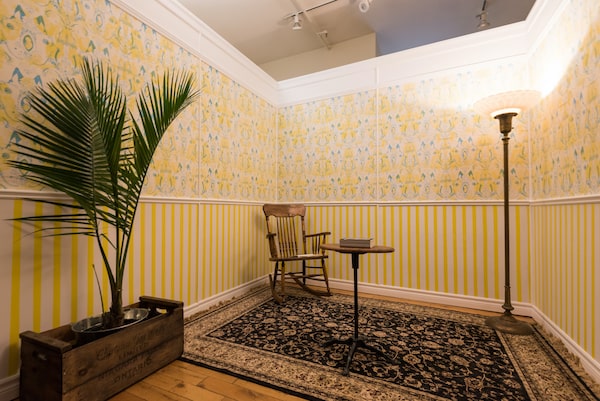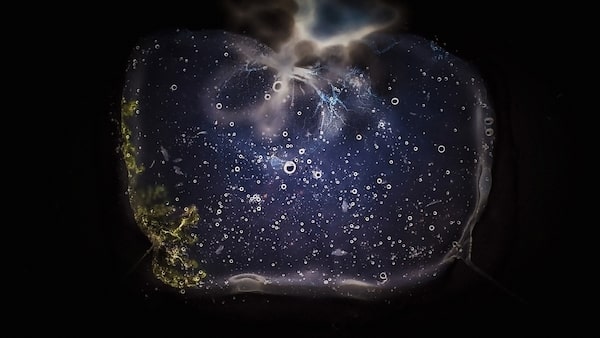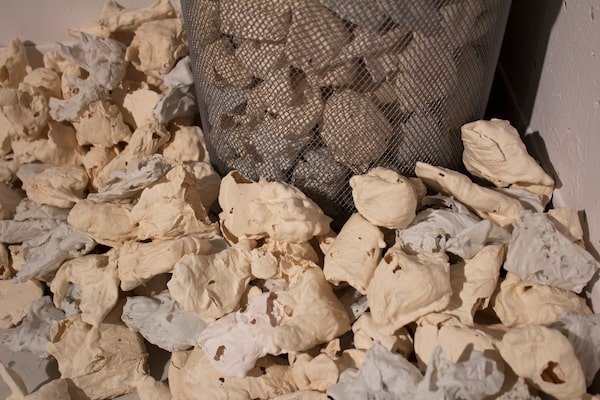
The Longernin Collective has built a wallpapered room with images and narration about postpartum depression.Handout
They call it Rendezvous with Madness. But perhaps in 2020, Rendezvous with Common Sense might be a better name.
The annual multi-arts festival devoted to mental health has moved online easily, offering streaming windows for films and a virtual tour of a visual art show. The transition has been smooth partly because the festival was doing its planning last spring, at the height of the pandemic’s first wave, and partly because organizers always knew they couldn’t afford to take risks. When the second wave hit this month, the festival quickly cancelled its in-person offerings.
“We always knew there would be a virtual tour, and we may or may not be able to be live,” artistic director Kelly Straughan said, explaining that when the festival invited artists last March, it was already warning them not to accept a spot if they couldn’t offer a virtual version of their work. “We were able to make a quick transition when we saw those [rising] numbers. … We were ready. It wasn’t breaking our hearts.”
Although under current provincial rules, the Toronto festival could in theory offer physically distanced tours of its art show, which opens on Thursday at the Workman Arts building on Dufferin Street, it decided that virtual was safest: “We serve a vulnerable population,” Straughan said.

Megan Moore’s multi-channel video work Ectoplasms creates vast galaxies from dark images of melting photographs that are being projected onto the dome above the stage of the main space.Handout
Named for Joseph Workman, the 19th-century reformer of Canadian mental-health care, Workman Arts began life as a small theatre company in 1987 at what was then the Queen Street Mental Health Centre. Rendezvous with Madness followed six years later, growing into a film, performance and visual art festival featuring work about mental health or created by artists with lived experience of mental-health or addiction issues. The provocative name represents a reclamation of sorts, as some mental-health survivors now embrace the term “mad.”
For a decade, the festival has been run from Workman’s Dufferin Street headquarters, a local church hall, but this virtual version waves a safely distant goodbye to that cavernous space. Next month, the group is moving a few blocks south into a purpose-built art facility at the Centre for Addiction and Mental Health campus on Queen Street.
In the meantime, it has filled the main hall and the basement on Dufferin Street with art under the title Re:Building Resilience. Here are installation pieces that directly illustrate the theme. Moncef Mounir recreates a psychiatrist’s office for his soundtrack of poetry; the Longernin Collective has built a wallpapered room with images and narration about postpartum depression. Kassandra Walters offers Untitled ([Not] Always Like This), a wastepaper basket overflowing with what might appear merely as crumpled tissues. In fact, the artist has preserved her used tissues in porcelain and repurposed them in a great variety of shapes.

Kassandra Walters offers Untitled ([Not] Always Like This), a wastepaper basket overflowing with what might appear merely as crumpled tissues. In fact, the artist has preserved her used tissues in porcelain and repurposed them in a great variety of shapes.Handout
And there are works where the madness metaphors are more distant. Justin Mencel pairs geometric blocks together in his sculptural paintings, playing a visual game with the concept of support: Which block is supporting which? In another context, these flat sculptures might be read as just witty bits of neo-abstraction. Megan Moore’s multi-channel video work Ectoplasms creates vast galaxies from dark images of melting photographs that are being projected onto the dome above the stage of the main space. The virtual tour misses the celestial effect of the ceiling projection, but instead offers engrossing closeups of the mysterious imagery.
While these visual artists all identify as having lived experience, in the film program, the stress is on the theme of mental health rather than the filmmakers' lives, in a series of documentaries and dramas that both evoke mental states and cover shattering stories of losses and abuses.
It launches on Thursday with Judy versus Capitalism. Shot by filmmaker Mike Hoolboom on Super 8, the film is an experimental biography of the Canadian feminist and social activist Judy Rebick. She tells the story of her life, from her traumatic childhood to her eventful adulthood, while Hoolboom pairs her narrative with an imagistic stream of consciousness, some of it archival, some of it staged.
The film program concludes with a remarkable first feature from Iranian film director Behzad Nalbandi entitled The Unseen. The homeless of Tehran are regularly rounded up when foreign dignitaries visit the city; the men are soon released, but the women are kept imprisoned. Nalbandi secretly visited the prison/shelter where they are held and taped audio interviews with the permission of inmates. Without a camera, he created visuals for the film by animating cardboard figures: In Farsi, the homeless are known as cardboard sleepers.
In the mouths of these little paper figures, stories of addiction, depression and abandonment become poignantly universal.
Rendezvous with Madness runs Oct. 15 to Oct. 25 online. See workmanarts.com for details.
 Kate Taylor
Kate Taylor